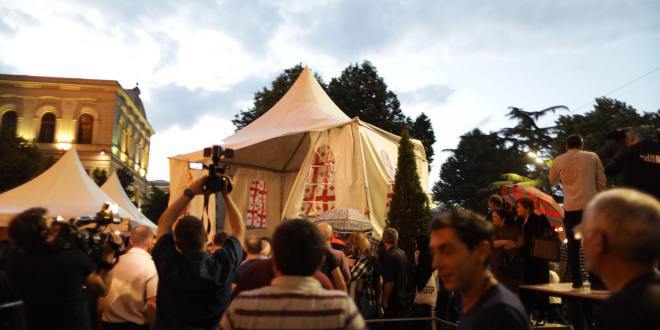Explainer | What is the “Tents Law” GD is Rushing through the Parliament?
On October 5, the Parliament endorsed the amendment to the Law on Assemblies and Demonstrations that the ruling party rushed through in an accelerated procedure. 74 MPs voted for and 22 against. The law, critics say, will provide the police with more powers to curtail the freedom of assembly.
Content of the Draft Law
The law, if adopted, would prohibit participants of any assembly or demonstration from setting up “temporary structures” (such as tents, shacks, etc.) if:
- Setting them up poses a threat to the participants of the assembly or demonstration or other persons;
- Interferes with the protection of public order and security by the police;
- Disrupts the normal functioning of the enterprise, institution, or organization;
- Without these structures, the holding of the assembly or demonstration is not substantially impeded, and/or its organization of the assembly or protest is not related to the holding of a demonstration.
Failure to comply would lead to a fine of 500 GEL and, in cases of severe violations, detention for a duration of up to 15 days.
Background
The explanatory note to the draft amendment says it was submitted following the statement of the State Security Service (SSSG) on September 18, where the agency spoke about the threat of certain groups planning to create a “tent city” in Georgia during the period of October-December, aiming to “destabilize the country.” SSSG followed up with another statement on October 2 accusing US-funded training of training civic activists for such protests.
GD Chair, Irakli Kobakhidze also said the accelerated adoption of the “tents law” is hinging on SSSG statements.
MP Tina Bokuchava of the opposition United National Movement (UNM) said the law restricts the freedom of assembly. The opposition parties, such as UNM, Girchi-More Freedom, and Droa say this is “another Russian law” referring to the law on “foreign agents” which would have curtailed the operation of civil society groups, which was passed, and then repealed by GD following mass public protest.
What do the watchdogs say?
The Georgian Young Lawyers’ Association (GYLA), Georgia’s pre-eminent legal watchdog, expressed deep concern about what they say is the ruling party’s attempt to narrow the space for the realization of civil rights and freedoms. GYLA says such attempts create “a repressive environment for free speech and expression.”
GYLA referred to the 2016 ruling of the Tbilisi City Court, which affirmed that “the right to assembly and demonstration includes the right to choose the place, time, form and content of the assembly, including the possibility of setting up temporary structures.” However, the court noted that this right must be subject to foreseeable and proportionate limitations.
The court further argued, “In particular, by analyzing the norm, a person should be able to clearly understand what type of behavior the legislator requires of him and, on the other hand, any intervention by the state in the right should have a legitimate purpose defined by the Constitution and should be the least restrictive for the implementation of the right.”
The GYLA contends that Georgia’s existing legislation already provides adequate guarantees for the state to intervene proportionately when there is a legitimate aim. They argue that the proposed amendments aim to restrict civil rights further, thereby diminishing the space for free expression in the country and ultimately affecting the quality of democracy and the well-being of its citizens.
Two other watchdogs, Transparency International-Georgia (TI-Georgia) and the International Society for Fair Elections and Democracy (ISFED) have also issued a joint statement regarding the draft amendment. They argue that the proposed amendments contain vague regulations that effectively impose restrictions and prohibitions that hinder the exercise of the right to assembly and demonstration and significantly weaken the protection of freedom of assembly and expression in the country.
TI and ISFED contend that these legislative changes shall be seen in conjunction with an ongoing pattern of issuing administrative detentions for activists, which have been a longstanding concern within the civil sector. They called on the Parliament to reject the initiative, “not to worsen the legal framework of freedom of assembly and expression in the country and to ensure the possibility of enjoying the rights and freedoms as guaranteed by the Constitution.”
Also Read:
- 02/10/2023 – Opposition MPs Skeptical About Security Services Claims of “Plot”
- 02/10/2023 – GD Leadership Doubles Down on Security Service Claims of “Plot”
- 02/10/2023 – Security Service Says USAID-funded Trainers were Plotting to Foment Unrest in Georgia
